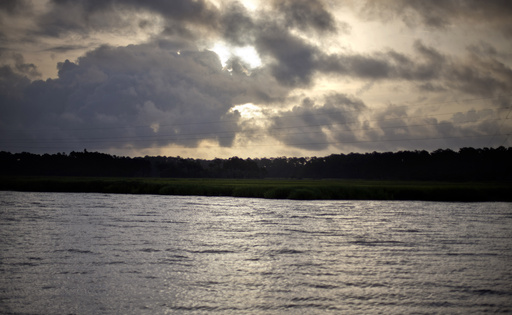
SAVANNAH, Ga. — The tragic partial collapse of a ferry dock during a cultural festival has left the historical Black community of Sapelo Island grappling with grief and uncertainty. Seven lives were claimed in this disaster, and the Gullah-Geechee residents are now facing significant emotional and social challenges, compounded by the ongoing issues of gentrification, increasing property taxes, and a continuing migration of islanders to the mainland in search of better educational and healthcare opportunities, as well as more job prospects and conveniences.
The annual Cultural Day festival, which took place last weekend, was intended to be a joyous occasion for the community to celebrate its unique heritage and the traditions stemming from a lineage of formerly enslaved individuals. Prior to the tragic incident where a metal walkway gave way, attendees were enjoying demonstrations of traditional crafts like basket weaving and fish net casting, alongside performances from the Gullah Geechee Ring Shouters that filled the air with music.
Now, many residents of the close-knit Hogg Hummock community on the island are experiencing a whirlwind of emotions, with anxiety and sorrow about what the future holds for their once peaceful home. Marquetta Goodwine, recognized as Queen Quet and the leader of the Gullah-Geechee nation, expressed that the community is struggling with the trauma of the incident. She highlighted that residents are understandably upset about the preventable nature of the accident.
The families of three of the deceased are being represented by civil rights attorney Ben Crump, who has called for federal investigators to look into the matter instead of relying on the local authorities from Georgia’s Department of Natural Resources.
Local resident Reginald Hall, whose ancestors were the island’s founders, fears that the tragedy may deter tourists from visiting Sapelo Island. He conveyed a somber reflection on the situation, stating, “They came to the island to celebrate and they left off the island in body bags,” emphasizing the potential risk to the tourism sector.
Roger Lotson, the only Black commissioner in McIntosh County, which encompasses Sapelo Island, voiced concerns regarding the lasting psychological impacts on the islanders. Many who work and live there regularly traverse gangways similar to the one that collapsed, and he worries about the fear and anxiety such reminders may cause.
The Gullah-Geechee community, with roots tracing back to enslaved populations in the South, has preserved much of its African heritage due to geographical separation from the mainland. This isolation has helped maintain a distinct culture, including a unique dialect and skills in various crafts and agricultural practices. Anne C. Bailey, a historian, elaborated that this unique language development resulted from a mix of enslaved individuals needing effective communication.
Despite their contributions to Southern culture, particularly in culinary areas and rice cultivation, Gullah-Geechee people often go unrecognized. Bailey noted that the fruits of their labor primarily enriched slaveholders and traders rather than the enslaved themselves, leaving them without due recognition or compensation for their vital contributions to the economy.
Following the Civil War and Emancipation, some members of the Gullah-Geechee community managed to accumulate enough funds to purchase land. However, today, fewer than 30 historical Black towns remain in the U.S., a stark contrast to over 1,200 that existed during the late 19th to early 20th centuries, many of which were destroyed by racially motivated violence.
Current threats to Sapelo include aggressive development, changing political climates, and soaring property tax rates that increasingly burden lower-income residents. In October 2023, residents initiated legal action to block a zoning amendment that would allow for larger homes, intensifying fears that affluent outsiders might encroach on their land. Attempts to halt these changes through a referendum were recently hindered by a judicial order.
Lotson, even as a board member, reflects the challenges faced by residents in voicing their concerns. He stated, “Fighting only gives us a slim chance of winning, but if we did not fight, we have no chance of winning.”
Instances where infrastructure development has occurred without compromising Gullah-Geechee presence are rare. Bailey noted that places like Georgia’s St. Simons Island transitioned from being predominantly Black to a tourist hotspot frequented by wealthier non-Black residents, resulting in the loss of historical significance for the Black community.
Goodwine critically pointed out that obtaining resources should not come at the cost of relinquishing land. She remarked, “What you have done is essentially given away your soul.” To effectively support the community, she encourages outsiders to engage genuinely with the Gullah-Geechee people by participating in local events and promoting community-run businesses.
“It is that love, it is that sincere giving to a community instead of just coming to see what you can extract out and then leave with it,” she emphasized, illustrating the need for authentic community engagement and support.
